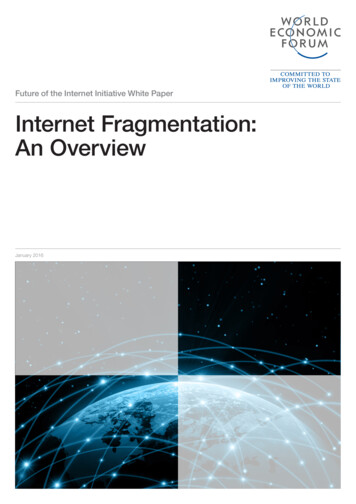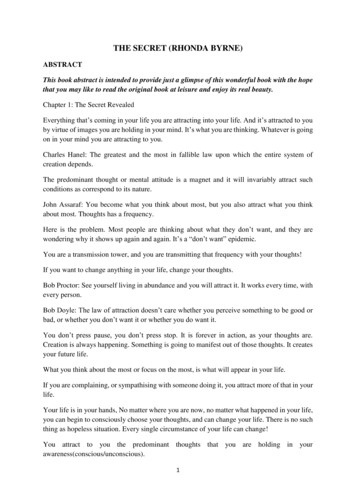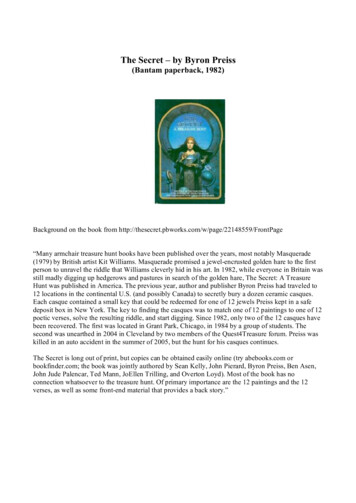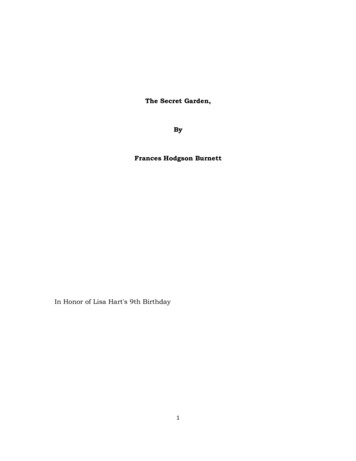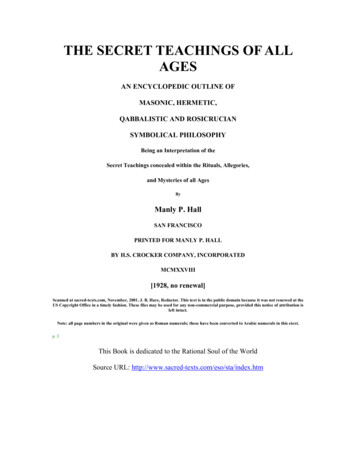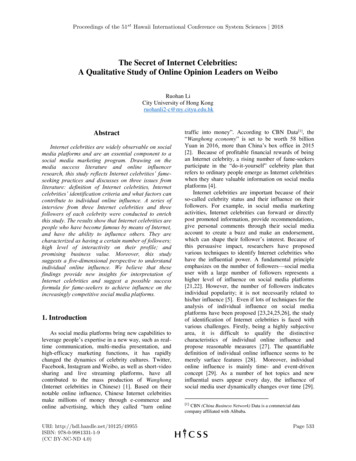
Transcription
Proceedings of the 51st Hawaii International Conference on System Sciences 2018The Secret of Internet Celebrities:A Qualitative Study of Online Opinion Leaders on WeiboRuohan LiCity University of Hong Kongruohanli2-c@my.cityu.edu.hkAbstractInternet celebrities are widely observable on socialmedia platforms and are an essential component to asocial media marketing program. Drawing on themedia success literature and online influencerresearch, this study reflects Internet celebrities’ fameseeking practices and discusses on three issues fromliterature: definition of Internet celebrities, Internetcelebrities’ identification criteria and what factors cancontribute to individual online influence. A series ofinterview from three Internet celebrities and threefollowers of each celebrity were conducted to enrichthis study. The results show that Internet celebrities arepeople who have become famous by means of Internet,and have the ability to influence others. They arecharacterized as having a certain number of followers;high level of interactivity on their profile; andpromising business value. Moreover, this studysuggests a five-dimensional perspective to understandindividual online influence. We believe that thesefindings provide new insights for interpretation ofInternet celebrities and suggest a possible successformula for fame-seekers to achieve influence on theincreasingly competitive social media platforms.1. IntroductionAs social media platforms bring new capabilities toleverage people’s expertise in a new way, such as realtime communication, multi-media presentation, andhigh-efficacy marketing functions, it has rapidlychanged the dynamics of celebrity cultures. Twitter,Facebook, Instagram and Weibo, as well as short-videosharing and live streaming platforms, have allcontributed to the mass production of Wanghong(Internet celebrities in Chinese) [1]. Based on theirnotable online influence, Chinese Internet celebritiesmake millions of money through e-commerce andonline advertising, which they called “turn onlineURI: http://hdl.handle.net/10125/49955ISBN: 978-0-9981331-1-9(CC BY-NC-ND 4.0)traffic into money”. According to CBN Data[1], the“Wanghong economy” is set to be worth 58 billionYuan in 2016, more than China’s box office in 2015[2]. Because of profitable financial rewards of beingan Internet celebrity, a rising number of fame-seekersparticipate in the “do-it-yourself” celebrity plan thatrefers to ordinary people emerge as Internet celebritieswhen they share valuable information on social mediaplatforms [4].Internet celebrities are important because of theirso-called celebrity status and their influence on theirfollowers. For example, in social media marketingactivities, Internet celebrities can forward or directlypost promoted information, provide recommendations,give personal comments through their social mediaaccount to create a buzz and make an endorsement,which can shape their follower’s interest. Because ofthis persuasive impact, researchers have proposedvarious techniques to identify Internet celebrities whohave the influential power. A fundamental principleemphasizes on the number of followers—social mediauser with a large number of followers represents ahigher level of influence on social media platforms[21,22]. However, the number of followers indicatesindividual popularity; it is not necessarily related tohis/her influence [5]. Even if lots of techniques for theanalysis of individual influence on social mediaplatforms have been proposed [23,24,25,26], the studyof identification of Internet celebrities is faced withvarious challenges. Firstly, being a highly subjectivearea, it is difficult to qualify the distinctivecharacteristics of individual online influence andpropose reasonable measures [27]. The quantifiabledefinition of individual online influence seems to bemerely surface features [28]. Moreover, individualonline influence is mainly time- and event-drivenconcept [29]. As a number of hot topics and newinfluential users appear every day, the influence ofsocial media user dynamically changes over time [29].[1]CBN (China Business Network) Data is a commercial datacompany affiliated with Alibaba.Page 533
Thus, the varied time and event make thequantification of online influence more complex [27].Given the recognition that individual influence onsocial media platforms is about quality, not quantity[31,32]; researchers call for more subjective anddetailed understanding of the assessment of Internetcelebrities who have influential power online [28].To this aim, our study focuses on Chinese Internetcelebrities (Wanghong) on social media platforms, byexamining the following research questions: (1) Whocan be considered as Internet celebrities (Wanghong)on social media platforms? (2) What factors contributeto Internet celebrities’ online influence? We attempt toprovide a comprehensive understanding of Internetcelebrities and explain online influence of Internetcelebrities based on their ability to provide certainvalues for audiences. Inspired by Du and Wagner’s theweblog success model [8], and the study of emotionalvalue [9], we proposed individual online influencecould be understood from a value-based proposition.We adopted interviews with three Internet celebritiesand three followers of each celebrity to enrich thisstudy. The paper is organized as follows. Literaturereview part provides a systematic review of the relatedstudies of Internet celebrities and the media successliterature to understand online influence of a socialmedia user from a value-based proposition.Methodology part clearly demonstrates the researchdesign of this study, how we developed the interviewprotocol, how we selected the proper informants andhow we conducted the interview. We also suggest thefindings and the contributions as the conclusion.2. Literature reviews2.1. Internet celebrities (Wanghong)The advent of social media has brought a new typeof celebrity. People who are not well recognized in reallife could utilize Internet to perform as Internetcelebrities. This new type of celebrity involves thepractice of self-presentation on social media, which ispresented by the creation of unique online image andthe use of image to attract online eyeball [7,30]. Yet,people who have online influence on others haveappeared for years, there is no widely accepted termand specific definition to describe them. Researchershave used different labels to depict this new type ofcelebrity, including social media influencers (SMIs)[25,28], influential bloggers [14], famous Instagrambloggers [7] or YouTube stars [10]. In China, no matterwhat social media platforms they emphasized on,people who have achieved influence based on the useof Internet have a unified name—Internet celebrities(Wanghong) [2]. They can range from would-be orunknown actors/actresses, experts in a specific field,for example, fitness trainers or photographers, andwealthy people who would love to show off theirluxuries to young girls have pretty face [7,11,12].While the label or actual identity differs, Internetcelebrities all disclose their personal lives [12] andexhibit influence to a large number of followers [30]on social media platforms. Some of the most successfulChinese Internet celebrities (Wanghong) have earnedtheir living based on their online influence [2]. Internetcelebrities have been deemed as trusted members oftheir own online community; their followers rely uponthem for information, news, and opinion [13]. In thisstudy, we describe Internet celebrities as a kind ofonline opinion leaders who were likely to influenceother persons on social media platforms.2.2. Measuring influence of Internet celebritiesfrom a value-based propositionIt is not easy to achieve influence online since notall the ideas appear online would be equally interestingand valuable [25]. Prior studies have researched thesuccess of many emerging online interactive mediaapplications. For example, how to make weblogsuccess online [8].The weblog success modelproposed by Du and Wagner attributes a weblog’ssuccess to its ability to offer certain values foraudiences/readers. The first value factor refers to thecontent value, the information itself, like any otherforms of web content [8]. Content type, postingvolume/frequency, and writing style would affect thecontent value. The second value factor is technologythat used to present content and initial socialinteraction [8]. Multimedia capability of social mediaplatforms displays a very different effect than textcontent and it facilitates the interaction among users.Another important value factor is regarded as the socialresources established on weblog. In addition to theaforementioned value factors from weblog successmodel [8], emotional value that is characterized as theaggregated feeling of goodwill also plays an importantrole in social media success within organizations [9].From a marketing perspective, providing values forcustomers and potential customers could enhancepurchase interest [33]. However, Social media usersinvest in time, feelings and emotions rather than theeconomic motivation in shopping behavior [34], theyinteract with others with the expectation of gettingsome values in return [3]. Thus, we propose thatindividual online influence could be understood from avalue-based proposition. Based on the findings fromDu and Wagner’s the weblog success model [8], andthe study of emotional value [9], this study aims toPage 534
interpret individual success (Internet celebrities whohave influential power online) from a value-basedproposition. It is reasonable that Internet celebritiesprovide different values for their followers to maintainonline influence, for instance, they might offer highquality content, no matter useful or entertaining; utilizeproper technological functions to conduct selfpresentation; maintain a close social relationship andbuild emotional bonds with others and so on. Thus, weconsider the online influence of Internet celebritiesrelates with their ability to provide values for theirfollowers.3. MethodologyAs a micro-blogging website, Weibo combinessocial media and e-commerce characteristics [15],which largely helps Internet celebrities to promoteactivities and themselves. Through providing usefultips and advice, Internet celebrities play an importantrole in shaping people’s attitudes and act like a trustfuladvisory on Weibo [16]. Therefore, Weibo is an idealplatform to investigate research questions on onlineinfluence of Internet celebrities. We conductedinterviews with Internet celebrities and their followersdirectly to understand online influence of Internetcelebrities. Interview approach aims to strengthenrelations between academia and industry, which bringstheory closer to real practices [36]. It allows us toidentify more subjective insights about the influence ofInternet celebrities from Internet celebrities’ sides andtheir followers’ sides. Inspire by the study of [37], tofind out how to define Internet celebrities, we sendinterview invitations using the direct message function(DMs) on Weibo to potential respondents who areidentified as Internet celebrities based on theclassification of influencer on social media [38]. Evenif this classification is made on the basis of the numberof followers, the number of followers may not fullyrepresent online influence [29], it is still valuable tohelp us to find potential respondents. In thisclassification, differences in the number of followersrepresent the different online influence. Internetcelebrities who have 1000 to 100,000 followers arecharacterized as the up-and-coming category; Internetcelebrities who have more than 100,000 followers aredescribed as the popular category; Internet celebritieswho have more than 1 million followers indicate thehighest online influence. This purposeful samplingfrom different categories maximized the depth and therichness of the data [41]. We received six responsesthrough direct messages to our interview invitationsand three of them agreed to participate in interviews.Fortunately, those three participants are from the threecategories respectively, which means each targetcategory has responses. After the interview withInternet celebrities, we asked them to recommend usthree of their followers as respondents from followerside. For the validation of data, triangulation acrossresources [39,40] was realized through interviews heldwith Internet celebrities and their followers withdifferent backgrounds and demographic information(as shown in Table 1). Using an individual semistructured interview protocol, each participant wasasked a series of open-ended questions based on theresearch questions: (1) Who can be considered asInternet celebrities (Wanghong) on social mediaplatforms? (2) What factors contribute to Internetcelebrities’ online influence? We rely on measurementitems from the weblog success model [8], andattributes of emotional value [9] as interview questionsto measure what factors may affect online influence ofInternet celebrities. Interviews with participants wereconducted individually in Chinese, by using instantmessage application with audio chat function, WeChat.Each interview lasted for approximately 30 minutes.All interviews were audio recorded and accompaniedwith written notes to avoid difficulties later in thetranscription and coding process. The interview audiorecordings were transcribed into text by using a speechrecognition software, iFLYTEK Open Platform. Theauthor also manually checks the accuracy of thetranscription. The transcription has been translated inEnglish and checked for validity by two Chinesebackground researchers. The coding process is shownas the following steps: Firstly, authors open-coded theinterview transcription to gain general expressions thatare based on their units of meaning [55] Then, codeswere assigned according to the themes indicated in theparticipants’ own description, which is called in vivocoding technique [17]. Then
bloggers [7] or YouTube stars [10]. In China, no matter what social media platforms they emphasized on, people who have achieved influence based on the use of Internet have a unified name—Internet celebrities (Wanghong) [2]. They can range from would-be or unknown actors/actresses, experts in a specific field, for example, fitness trainers or photographers, and wealthy people who
